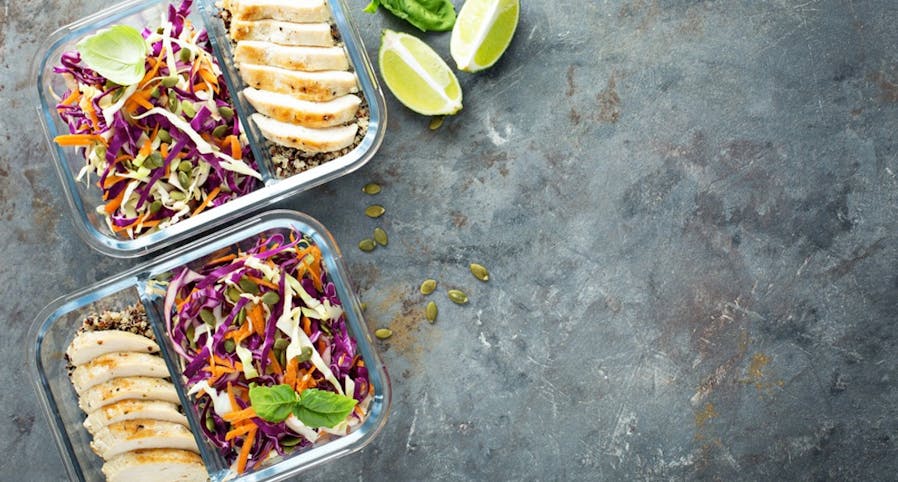Organized Health: How to Meal Plan
Getting in shape and staying healthy requires some serious planning, and if you don't know how to meal plan then the journey to health will be a lot harder.
Are you used to grabbing many of your meals on the go? Do you tend to run to the store just before dinner? Are you considering the advantages of making a meal plan?
Many of us develop a cooking repertoire on the go. Yet well-balanced meals with healthy food require a bit of forethought.
If you're wondering how to meal plan, look no further. Here are our favorite thoughts on getting started.
Advantages of Meal Planning
Good meal planning can help you save time and money at the grocery store. You can organize your lists in aisles, so you won't need to keep going back and forth between departments. It can also help you avoid the last-minute trip because you realized you don't have an ingredient.
Meal planning can also help you to save money. You can plan your meals based on your local store's weekly specials, or you can plan your recipes so you can use up your leftovers and avoid buying more food. It's also a great way to avoid takeout costs, which can really add up.
Meal planning can also help you avoid unhealthy food options. These could come from fast-food restaurants or just frozen food that seems convenient.
Being tired or hungry can quickly lead to poor food choices. If you're looking to slim down, planning your meals with healthy ingredients ahead of time can help you avoid last-minute mistakes.
If you're serious about weight loss, you may even be able to find a local meal-planning service that can help you eat quality, lower-calorie meals.
Weight loss can boost your energy levels, improve your mood, and even help you concentrate better. It can also help reduce your risk of high blood pressure, diabetes, and certain types of cancer.
If you're serious about improving your health, quality meal planning could be the key to a happier lifestyle.
Start With What You've Got
Before you plan out your meals for the week, take a look at what you've already got on hand in your home. Do you have a stock of brown rice, frozen veggies, or fresh fruit?
You can start by thinking about how which of the ingredients you already have and how you can build on them for simple, nutritious meals. You'll save a lot of money in the end if you don't let staples in your pantry go to waste.
List Days and Meals
A simple chart can help you plan out which days of the week you're planning on eating from home, as well as the meals you need to prepare.
You may, for example, eat most of your lunches at your work cafeteria, so you'll only need to plan out your breakfasts and dinners. Still, homemade lunches could end up saving you a bit of money and allow you to cut back on calories. A few extra minutes spend preparing your noontime meal the night before while you're watching television could be one of the best things you can do for your health!
Write down what you plan on eating each day, and consider how leftovers can work into your plan. For example, if you're making a rotisserie chicken one night, you can use the leftover meat to prepare a healthy salad for the next two days. It's important to consider how much you're honestly going to eat, and how much could end up getting wasted.
List Ingredients
After you've decided what you want to eat, make a list of all the ingredients you'll need to make each meal. This may require a little recipe research. After you've been meal planning for a while, you'll eventually remember the ingredients you'll need for your favorite creations.
Once you've made a chart, you can start creating a grocery shopping list from your ingredients. Keep all of your dairy items together, as well as your poultry and fresh produce. This way, even if you need to get used to the layout of your local grocery store, you won't be revisiting the same aisles many times for different items.
Go Shopping!
Grocery shopping on a budget is an art for some. You may want to check out specials before you decide what you're going to make that week. Or you can sign up for a digital coupon account so discounts will get added to your order at the end.
Some super serious savers will travel to a few different local grocery stores for ingredients to make sure they're always getting the best deal. While this can be an excellent way to save money, it may not always fit into your schedule.
The important thing is to find a local grocer with quality, fresh ingredients and prices that fit into your budget. Ask your neighbors for recommendations if you're not sure where to start.
Start Cooking
It's important to remember that cooking isn't an exact science the way baking is. As you start preparing your meals, you may find that your tastes call for a little more sauce or a little less salt.
Give yourself some grace as a beginner chef. But you should always remember to keep your meals healthy and your portion sizes reasonable!
How to Meal Plan
Meal planning is a skill that's important for every adult. If you're wondering how to meal plan, start by doing a little research and deciding what you want to prepare. With some careful thought and a little creativity, you could be on the road to a healthier lifestyle in no time.
Don't stop getting smart about your waistline now. For more healthy, carefully planned meals delivered right to your door, contact us today.

